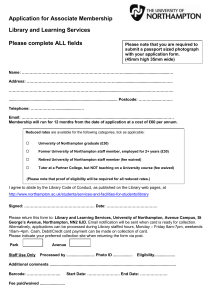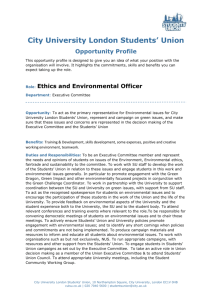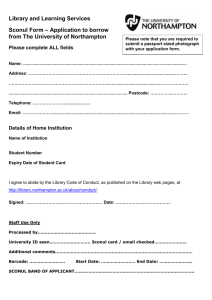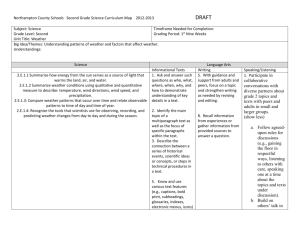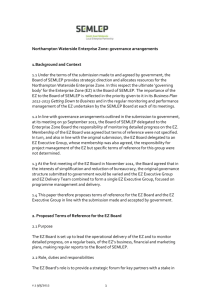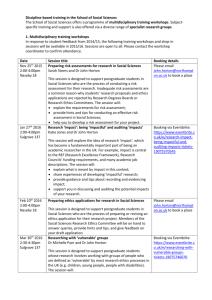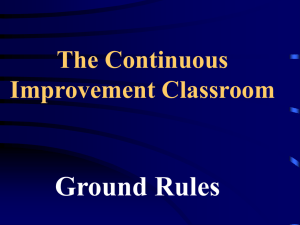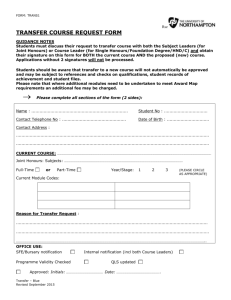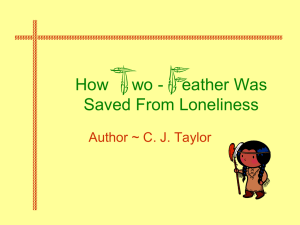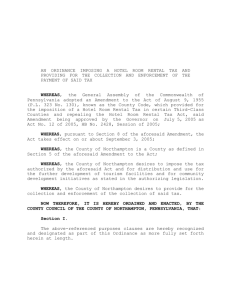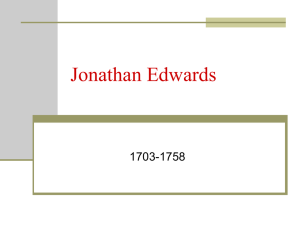Report of the Inaugural Meeting
advertisement
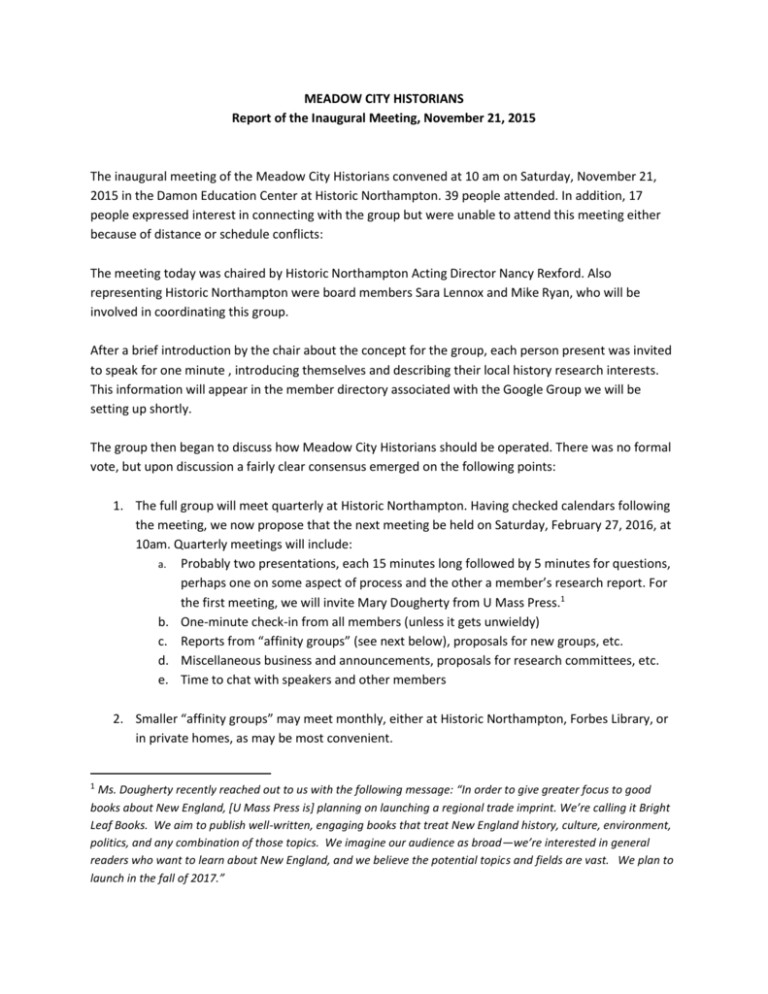
MEADOW CITY HISTORIANS Report of the Inaugural Meeting, November 21, 2015 The inaugural meeting of the Meadow City Historians convened at 10 am on Saturday, November 21, 2015 in the Damon Education Center at Historic Northampton. 39 people attended. In addition, 17 people expressed interest in connecting with the group but were unable to attend this meeting either because of distance or schedule conflicts: The meeting today was chaired by Historic Northampton Acting Director Nancy Rexford. Also representing Historic Northampton were board members Sara Lennox and Mike Ryan, who will be involved in coordinating this group. After a brief introduction by the chair about the concept for the group, each person present was invited to speak for one minute , introducing themselves and describing their local history research interests. This information will appear in the member directory associated with the Google Group we will be setting up shortly. The group then began to discuss how Meadow City Historians should be operated. There was no formal vote, but upon discussion a fairly clear consensus emerged on the following points: 1. The full group will meet quarterly at Historic Northampton. Having checked calendars following the meeting, we now propose that the next meeting be held on Saturday, February 27, 2016, at 10am. Quarterly meetings will include: a. Probably two presentations, each 15 minutes long followed by 5 minutes for questions, perhaps one on some aspect of process and the other a member’s research report. For the first meeting, we will invite Mary Dougherty from U Mass Press.1 b. One-minute check-in from all members (unless it gets unwieldy) c. Reports from “affinity groups” (see next below), proposals for new groups, etc. d. Miscellaneous business and announcements, proposals for research committees, etc. e. Time to chat with speakers and other members 2. Smaller “affinity groups” may meet monthly, either at Historic Northampton, Forbes Library, or in private homes, as may be most convenient. 1 Ms. Dougherty recently reached out to us with the following message: “In order to give greater focus to good books about New England, [U Mass Press is] planning on launching a regional trade imprint. We’re calling it Bright Leaf Books. We aim to publish well-written, engaging books that treat New England history, culture, environment, politics, and any combination of those topics. We imagine our audience as broad—we’re interested in general readers who want to learn about New England, and we believe the potential topics and fields are vast. We plan to launch in the fall of 2017.” a. b. c. d. Affinity groups may go in and out of existence or change focus as needed Each group will have a coordinator responsible for venue, communications, etc. Each group will set its own calendar, agenda and format Members may belong to more than one affinity group 3. Google Group a. Open only to Meadow City Historians b. Will include: i. Directory of members with emails and description of research interests ii. Calendar showing dates of all meetings, both quarterly and the affinity groups iii. Mechanism allowing members to email the entire group iv. Mechanism for posting individual members’ announcements and questions, such as, “anybody who runs across any information about Charles Starkweather (1819-1906), please contact Jane D. Smith” v. Folder for storing reports of meetings and affinity groups vi. Folders for longer documents. This could be anything, perhaps for example lists of resources, guidelines for citations, advice for doing deed research, etc. c. The Google Group may be supplemented or replaced by an online forum once we get a better sense of how we use it and what we need. 4. Facebook page a. This will be our public face to the “outside world” b. Information posted here will be fully public, such as announcements and public reports on meetings and programs, contact information for group leaders, requirements for participation, how to join, etc. 5. Any of these arrangements can be modified if experience suggests a possible improvement. Nancy Rexford announced three research topics to which members are invited to participate: 1. Parsons House interpretive plan: the current idea is to focus on the Northampton of Jonathan Edwards, placing the house and the Parsons family in the broader social structures of the town. For this project, we’ll need to organize a research group and create a work plan. We’ll try to have something in place by the next meeting in February. 2. Northampton Timelines: a website that connects histories of Northampton locations with an interactive map. Goal is to post all MHC Form B’s and all HN and Forbes photographs of local buildings on this site in 2016. Researchers are warmly encouraged to share information about individual properties through this site. We will have more information about how to participate at the next meeting. For now, see www.northamptontimelines.org. 3. Northampton Mayors: Mayor David Narkewicz would like to have information about the accomplishments of each of our past Northampton mayors to accompany their photographs in a new conference room. The formal part of the meeting ended about 11:30. One item of importance was inadvertently omitted. The name “Meadow City Historians” has been used so far as a “working title” for the group, but the plan was to have the group discuss whether some other name would be preferable. We’ll get the discussion started via email and settle it at the February meeting. Respectfully submitted Nancy Rexford
